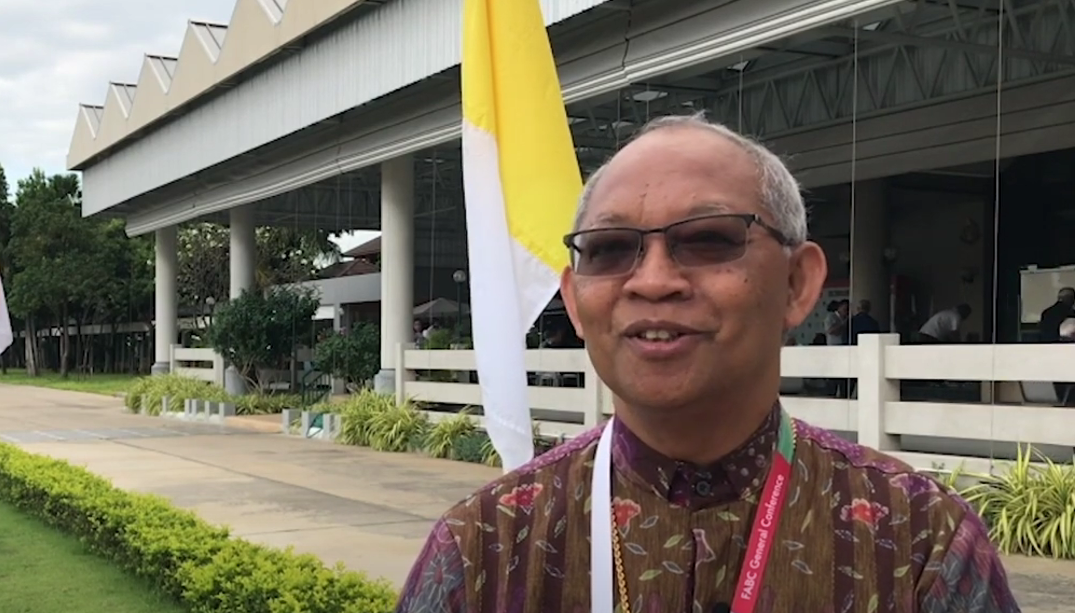
Indonesian Bishop Declines Scarlet Biretta After Pope Francis Names Him Cardinal
Indonesian bishop Paskalis Bruno Syukur announced that he was declining to be named as part of the new group of cardinals to be appointed in a consistory later this year.
The Holy See’s Press Office director Matteo Bruni said late Tuesday (Oct. 22) that the 62-year-old Bishop of Bogor declined the scarlet, saying he wished to continue his personal growth “in service to the Church and the people of God” in his current role.
Cardinals and other bishops wear different shades of red in their everyday clothing. Normally, cardinals wear scarlet-colored vestments to distinguish themselves from other prelates, who wear amaranth ones. It also applies to the piping on their cassocks and other wearable items outside liturgical services.

According to Vatican News, Syukur was born in 1962 and made his solemn profession as a member of the Order of Friars Minor (otherwise known as the Franciscans) in 1989. He was ordained a priest two years later in 1991.
He was assigned to several posts within his religious order, culminating in his appointment as provincial master of the Franciscans in Indonesia from 2001 to 2009 and as the Rome-based General Definitor of the order for Asia and Oceania from 2009 to 2013.
In 2013, Pope Francis appointed Syukur the bishop of the Diocese of Bogor as one of the first prelates of his pontificate.
With Syukur declining the cardinalate, the number of clerics enrolled in the College of Cardinals dropped to 20.
According to a source familiar to Paper Straw Media, it is usual for Catholic prelates to decline the cardinalate, but they are often made “in private and prior to the public announcement of new cardinals.”
“In 2022, the Belgian bishop Lucas van Looy renounced his designation as future cardinal due to questions about his handling of clerical sex abuse,” the source said. “As far as I can trace, Syukur is the first cardinal-designate to publicly renounce his designation for reasons of spirituality / humility since the case of Fernando de Toledo Oropesa in 1578.”
The source declined to provide further comment on the matter.
Catholic Pundit Chimes In on Titles for Cardinals, Bishops
Meanwhile, Rufo Gil Albor, an assistant professor of the University of the Philippines Los Baños College of Human Ecology, shared on Facebook an objective criticism of the reflections made by another cardinal-designate for the upcoming consistory, Caloocan Bishop Pablo Virgilio David from the Philippines.
David, a progressive prelate who stood up against the Rodrigo Duterte administration’s “war on drugs,“ reflected on the use of titles and designations and his apparent disdain for such.
“How does one address a cardinal? Well, it depends,“ he opened his piece, explaining how prelates were normally addressed on formal occasions in the past. “But we are not living in those times anymore, are we? These titles are a thing of the past. And those who cling to them continue to live in the past.”
American Catholic scholar and musician Dr. Peter Kwasniewski commented on David’s musings and called them “[i]ncredibly shortsighted and narrow-minded.“
“Lord, deliver us from those who scorn the Middle Ages, the great Age of Faith, and adore at the altar of Modernity,“ he prayed.
It could be recalled that David became controversial for his alleged defense of Judas Iscariot, the apostle who betrayed Jesus Christ, according to the Christian Bible, in 2016. He doubled down on the matter as his homily for Spy Wednesday during the 2021 Holy Week observed by Christians.
Normally, the pope is addressed as “His/Your Holiness,“ while cardinals are addressed as “His/Your Eminence.“ Bishops are also addressed as “His/Your Lordship,” “His/Your Excellency,“ or “His/Your Grace,” depending on whether they are either auxiliaries (bishops under another bishop), ordinaries (bishops of a diocese), or archbishops (bishops of an archdiocese).
Albor, a practicing Catholic, stressed that David’s reflections on the use of ecclesiastical titles contain “several logical fallacies“ that reveal what he claims are “inconsistencies“ in the cardinal-designate’s train of thought.
“[I]t is important to stress that this analysis is not meant to detract from the respect and reverence due to the bishop, who, as a successor of the Apostles, holds a position of authority within the Church,“ Albor said. “This analysis … aims not to undermine the bishop’s dignity but to highlight certain logical inconsistencies while maintaining due respect for his office.”
Albor explained in detail that David committed several logical fallacies such as false dichotomy, straw man argument, appeals to antiquity and emotion, hasty generalization, equivocation, and red herring.
“To end, this logical analysis does not intend to detract from the reverence owed to the bishop as a successor of the Apostles, as the Catechism [of the Catholic Church] clearly teaches,“ he added. “Rather, it shows that even those entrusted with great spiritual authority remain human and capable of making errors in reasoning or speech.”
When asked about Syukur’s decision to decline the cardinalate, Albor expressed discomfort.
“It presents a false dilemma,“ he told Paper Straw Media. “Spiritual growth and accepting the cardinalate are not mutually exclusive, as many cardinals continue to deepen their spiritual lives while serving in that capacity.”
David has not yet responded to any of the recent criticism against him.